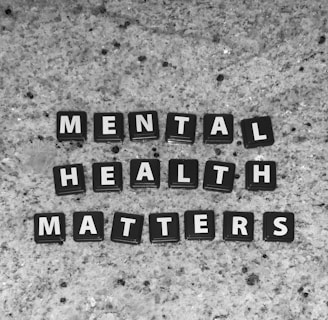US Patriarchy and Mental Health
This blog explores the impact of patriarchy on mental health in the U.S., particularly how it contributes to loneliness, anxiety, and self-doubt in women, children, and LGBTQ+ individuals. It highlights how societal pressures and systemic inequalities fuel emotional distress. To counteract these effects, the blog offers simple daily practices like mindfulness, journaling, and building authentic connections that promote healing and empowerment. By making small, intentional shifts, individuals can reclaim their well-being and foster a sense of connection in an isolating world.
PATRIARCHY
Christa Gonzalez
3/20/20252 min read


The US Patriarchy and Its Impact on Mental Health: How Small Daily Practices Can Foster Healing
The United States has long been shaped by patriarchal structures that deeply impact the mental health of women, children, and LGBTQ+ individuals. These systems foster environments where many feel isolated, unheard, and undervalued, leading to a rising mental health crisis. Loneliness, in particular, has become an epidemic, affecting millions across the country. However, by integrating small, intentional practices into daily life, individuals can begin to reclaim their well-being and cultivate a sense of connection and empowerment.
The Weight of Patriarchy on Mental Health
Patriarchy operates as a social and cultural system that prioritizes male dominance while marginalizing others. Women, children, and LGBTQ+ individuals often bear the brunt of this system, experiencing everything from workplace inequality and reproductive oppression to the invalidation of their identities and lived experiences. This persistent marginalization leads to widespread mental health struggles, including depression, anxiety, and feelings of worthlessness.
For women, societal pressures to conform to unrealistic beauty standards, caregiving roles, and professional expectations create chronic stress and burnout. Children raised in patriarchal households may internalize harmful gender norms, impacting their self-esteem and emotional resilience. LGBTQ+ individuals, frequently subjected to discrimination and exclusion, face an increased risk of mental health conditions, including suicidal ideation and self-isolation.
Loneliness: An Epidemic in America
The loneliness epidemic in the U.S. is at an all-time high, exacerbated by societal structures that discourage vulnerability and emotional connection. Many people struggle to find safe spaces where they can express their true selves without fear of judgment or rejection. Social media, while a tool for connection, often deepens feelings of inadequacy and alienation, reinforcing patriarchal ideals of success and self-worth. Without strong support systems, individuals are left feeling isolated, which directly impacts their mental and physical health.
Small Daily Practices to Foster Healing
While dismantling patriarchal structures is a long-term societal effort, individuals can take daily steps toward healing and reclaiming their mental well-being. Here are some simple yet powerful practices to incorporate into daily life:
Mindful Self-Compassion: Challenge internalized patriarchal beliefs by practicing self-love. Speak to yourself with kindness, set boundaries, and acknowledge your worth beyond societal expectations.
Journaling for Emotional Processing: Writing down thoughts and emotions helps release suppressed feelings, recognizes patterns of self-doubt, and builds self-awareness.
Building Authentic Connections: Seek out communities that foster inclusivity and emotional safety. Whether through support groups, online forums, or close friendships, finding like-minded individuals can counteract loneliness.
Daily Meditation and Breathwork: These practices help regulate the nervous system, reduce stress, and enhance self-awareness, promoting a sense of inner peace amidst external chaos.
Limiting Toxic Media Consumption: Reduce exposure to social media and entertainment that reinforces patriarchal norms. Instead, consume content that uplifts and empowers diverse voices.
Advocating for Change: Small acts of activism, whether through conversations, voting, or supporting marginalized communities, can empower individuals to feel part of a larger movement towards equity and justice.
Conclusion
Patriarchy’s influence on mental health and loneliness in the U.S. is profound, leaving many feeling isolated and unheard. However, by incorporating intentional self-care practices, building authentic connections, and advocating for systemic change, individuals can begin to heal and reclaim their mental well-being. While societal transformation takes time, healing starts within—and even the smallest daily shifts can create a ripple effect of empowerment and connection.
